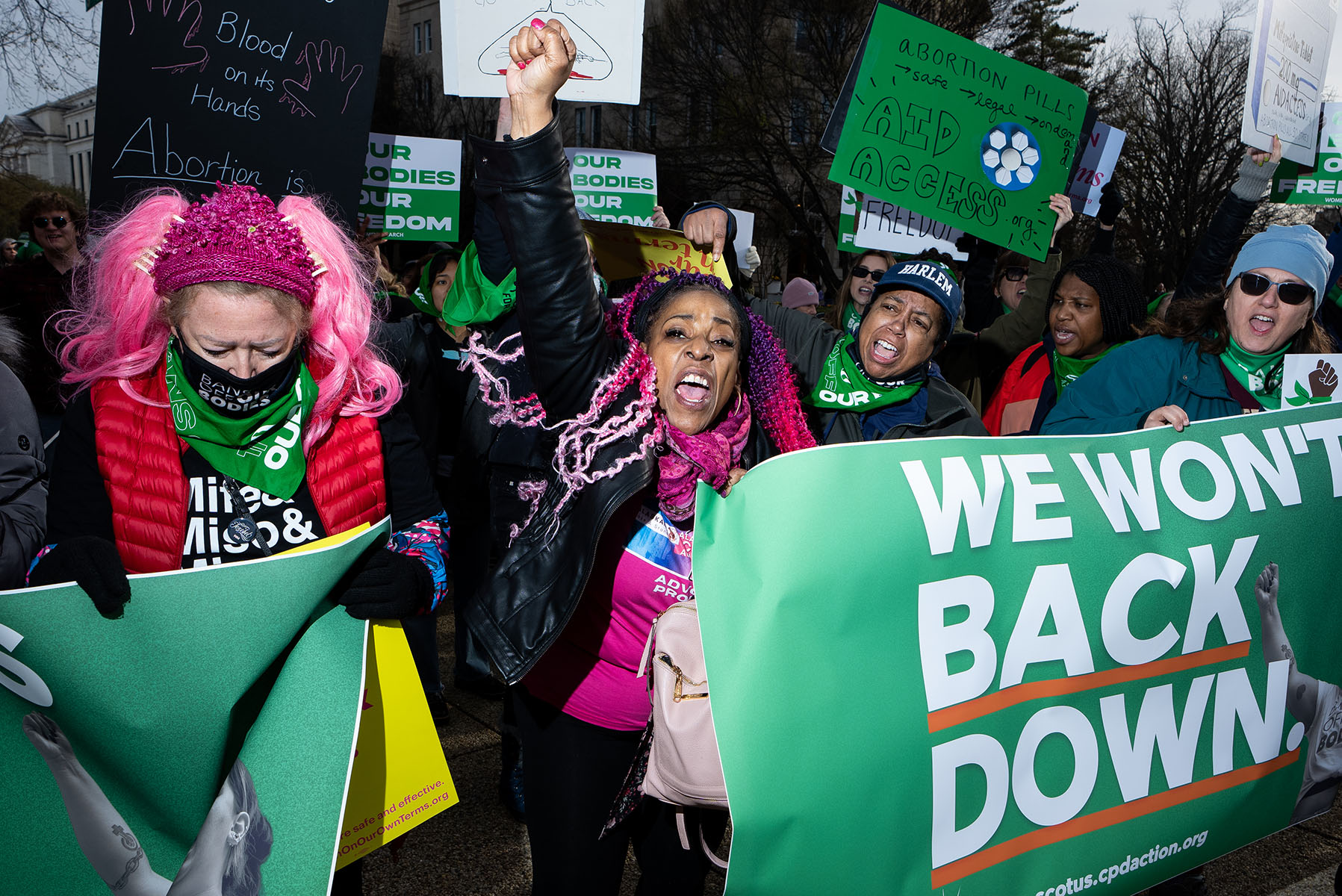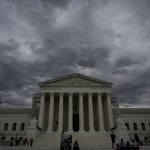In the first abortion-related case before the Supreme Court since its 2022 decision to overturn Roe v. Wade, a majority of the justices appeared to express skepticism that a coalition of anti-abortion doctors had the right to challenge the Food and Drug Administration’s 2016 and 2021 decisions to expand access to mifepristone, a drug used for medication abortion.
“What emerged from that oral argument is that standing is top of mind. There were very, very few questions that went to the merits of the claims,” said Elizabeth Sepper, a professor at the University of Texas Law School who specializes in health law, and who listened to the justices deliberate but is not involved in the litigation.
Lawyers for the FDA and drug manufacturer Danco argued that a group of doctors known as the Alliance for Hippocratic Medicine did not have standing to challenge the agency’s decisions because they were unlikely to have been harmed by changes in 2016 and 2021 that expanded access to mifepristone — an argument that appeared to resonate with both the court’s conservative majority and liberal minority.
Attorneys for the alliance argued that the expanded provisions violated anti-abortion emergency room physicians’ conscience protections, forcing them to care for patients experiencing complications as a result of using mifepristone. Complications from taking mifepristone and misoprostol, the medication abortion regimen, are incredibly rare.
Justice Ketanji Brown Jackson, President Joe Biden’s only confirmed justice to the nine-member court and its first Black woman, told Erin Morrow Hawley, the lawyer arguing on behalf of the anti-abortion alliance, that she didn’t “want her to hypothesize” about potential harm and instead point to real-world impact on her clients.
“Can you point me to any place in the declarations where a declarant states that they attempted to object but were unable to?” Jackson asked. “My question is: Isn’t that enough to remedy their issue? Do we have to also entertain your argument that no one else in the world can have this drug, or no one else in America should have this drug, in order to protect your clients?”
Conservative justices also questioned Hawley about the anti-abortion doctors’ standing, or whether they have been personally harmed, which would give them the right to bring a challenge to the court.
The Alliance for Hippocratic Medicine formed in the wake of Roe’s overturn with the stated mission of “protecting the vulnerable at the beginning and end of life.” It acts as an umbrella for anti-abortion organizations with strong ties to powerful figures in conservative politics that have played an outsized role in shaping the federal judiciary, including the Supreme Court. The litigation, which began as a challenge to the FDA’s 2000 approval of mifepristone but was narrowed in scope by lower courts, offers a test of the anti-abortion movement’s strategy after the court’s June 2022 ruling in Dobbs v. Jackson Women’s Health Organization ended the federal right to abortion that had existed since the 1973 decision in Roe.
Though it did not dominate discussion on Tuesday, the court’s two most conservative justices — Samuel Alito and Clarence Thomas — expressed openness to implementing provisions of a long-dormant 1873 immorality law cited by the anti-abortion doctors. Abortion opponents hope the once-obscure law, known as the Comstock Act, could be leveraged to ultimately ban abortion.
If the case is not decided on standing, the justices will decide the merits of the alliance’s arguments that the FDA did not appropriately consider the risks of mifepristone in a 2016 decision that removed a requirement that patients receiving the drug make three in-person visits to a medical provider, and raised the gestational age at which it could be used from 7 weeks to 10. Then, in 2021, during the COVID-19 pandemic, the agency removed in-person visit requirements entirely, allowing for the drug to be prescribed through telemedicine.
If the court is sympathetic to the alliance’s reasoning, it has the potential to fundamentally undermine the government’s authority to regulate and approve drugs. The vast implications for the pharmaceutical industry could include opening the door to copycat cases challenging other politically controversial treatments. It could also significantly curtail access to mifepristone and to abortion at large, once again shrinking the window in which abortion pills can be prescribed and requiring in-person visits.
The alliance’s requested remedy “would severely disrupt the federal system for approving drugs,” said solicitor general Elizabeth Prelogar, arguing for the FDA. “It would also inflict grave harm on women across the nation.”
Telemedicine poses an existential threat for the anti-abortion movement in a country where patients in states with abortion bans have been able to order medications via providers practicing in states with laws that are meant to shield them from abortion-related prosecutions. No provider or patient using these “shield laws” has faced criminal charges, but abortion opponents have said stopping this practice is a top priority.
A decision will likely come in June, in the final months before the November elections, with Biden and most down-ticket Democrats running explicitly on protecting abortion rights, including access to medication abortion. Eleven states and two territories are electing a governor this year, along with 44 states holding legislative elections. A third of U.S. Senate seats are on ballots, and all 435 House of Representatives seats are up for grabs, positioning abortion as a potent differentiator between the two parties.
Republican former President Donald Trump’s Supreme Court picks cemented the conservative supermajority that overturned nearly 50 years of the federal right to abortion in its Dobbs decision, leading to the mifepristone challenge. Approval of the high court is at near-record lows, and more than 6 in 10 Americans favor keeping mifepristone legal with a prescription, according to recent polling from the nonpartisan firm Gallup.
The hearing signaled some interest from the court’s most conservative members in resurrecting the Comstock Act, which outlaws mailing anything that is “intended for producing abortion.” The Department of Justice argues that this law, which has not been enforced in decades, does not apply to mifepristone, noting that it is not only used for medication abortion.
Yet in its suit, the alliance argued that the FDA’s decision violated the Comstock Act by allowing the mailing of drugs used in abortions. Abortion opponents hope that the law, which was never fully repealed, could eventually be the basis of a nationwide ban.
Both Thomas and Alito inquired specifically about whether the FDA or Danco had violated the Comstock Act. Alito referred to it as a “prominent provision” of federal code, though the law has only recently been discussed as a vehicle for banning abortion.
“We don’t think that there’s any case of this court that empowers [the] FDA to ignore other federal law,” Hawley said. “With respect to the Comstock Act as relevant here, the Comstock Act says [abortion] drugs should not be mailed either through the mail or common carriers.”
Thomas and Alito’s openness to enforcing the Comstock Act suggested that an anti-abortion presidential administration “will have the green light to prosecute drug companies for violation of the Comstock Act if they sent any abortion drugs or devices in the mail,” Sepper said.
Greer Donley, an expert on abortion law and professor at the University of Pittsburgh , said that it has been clear from the start that this case was not the ideal route to apply the Comstock Act to medication abortion distribution — but anticipated that come decision time, Thomas and Alito could offer a written roadmap for how they think it could be done. “I think that Thomas and Alito know something that is very obvious about this case, which is that it is not the right vehicle for Comstock. It never was. This is the anti-abortion movement’s attempt at making this part of the conversation and normalizing it a bit,” said Donley, who is not directly involved in the case but who signed an amicus brief arguing in the FDA’s favor.
Even without resuscitating the Comstock Act, reversing the FDA’s decisions — and in particular those that allowed for telemedicine — could have substantial practical implications. In 2023, medication abortions made up 63 percent of all abortions done in the United States, according to the Guttmacher Institute, a research institute that supports abortion rights but whose data is cited across the political spectrum. About 16 percent of abortions from June through September 2023 were conducted through telemedicine.
It is not clear how health care providers will respond if they are no longer able to virtually prescribe mifepristone. Some — particularly those providing care to patients in states with abortion bans — have suggested they could continue prescribing and mailing the drug anyway, in defiance of a Supreme Court ruling, though others may be deterred by the risk of violating the court’s order.
Medication abortions require both mifepristone and misoprostol. It’s possible to perform a medication abortion using solely misoprostol, in a larger dose. But that approach, while very effective and generally safe, has a higher failure rate than the two-drug option. It is also more painful, and some physicians have suggested switching patients to a misoprostol-only regimen could lead to a higher incidence of hemorrhaging.
Even if the case is dismissed on standing, it may not be the end of this line of litigation. Attorneys general in Idaho, Kansas and Missouri have raised similar challenges to the FDA’s permission of telemedicine. Lower federal courts have expressed openness to the argument — and in his questioning, Alito suggested he too might be willing to hear a challenge brought by those states.





